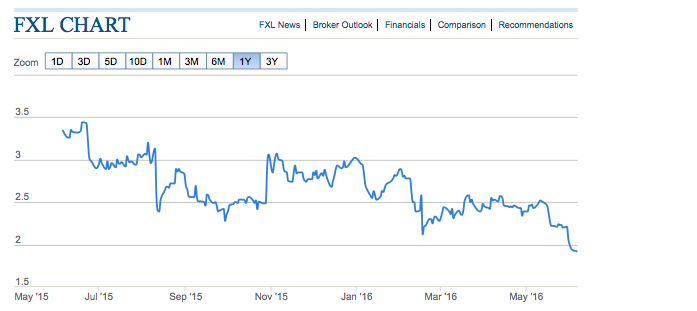Saying goodbye to FlexiGroup
Due to a steady stream of acquisitions, FlexiGroup has grown dramatically over the past five years. Since 2011, the company's loans and receivables have doubled, whilst its net debt has increased by 117 per cent.
Despite its assets doubling, the company's portfolio income has risen by a more sedate 57 per cent due to increasing competition in many of its businesses. Yet FlexiGroup's cash NPAT – statutory net profit after tax, excluding amortisation of acquired intangibles and adjusted for material one-off expenses – has increased by 70 per cent over this period.
How has this occurred? It isn't due to non-interest expense or provisions: the former have risen in line with portfolio income whilst impairment expense (measured as a percentage of total receivables) is similar to what it was five years earlier.
The main reason is falling financing costs: despite debt more than doubling, interest expense has risen by around 30 per cent as the average interest rate paid by FlexiGroup has fallen from 8.8 per cent in 2011 to 5.2 per cent today.
We estimate FlexiGroup's NPAT over the last 12 months would be similar to its 2011 cash NPAT if it still paid 8.8 per cent interest on its debts. This is purely a hypothetical exercise, of course, and ignores the asset side of the ledger, but it is useful in displaying how much the company has benefitted from declining debt costs.
Low interest rates, along with reasonable economic growth in both Australia and New Zealand, have also helped keep provisions more or less around the same level in recent years, although they've started to tick up recently.
We can't forecast where interest rates will move from here but note that they're currently at historic lows. Even if they do stay low for many years, as many commentators are now forecasting, we're probably at the level at which further reductions in FlexiGroup's cost of funds will be harder to achieve.
Despite hedging most of its floating-rate debt and building other protections into its debt repayment schedule, the company's large amount of short term debt means changes in interest rates would impact the company relatively quickly. There's also the possibility that it could be required to self-finance receivables if rising interest rates and/or a tightening of credit markets cause upheaval in the securitisation market.

Strategic update
This leads us to its recent strategy update, where management finally provided updated guidance on 2016 Cash NPAT. Upon the completion of acquisition of Fisher & Paykel Finance (FPF) – which operates the Q Card and Farmers Finance Card businesses in New Zealand – in March 2016, the company noted that it would ‘'shortly'' increase its guidance to include the contribution from FPF.
We were still waiting for an update at our last review and, as we noted then, the longer the company delayed updating investors, the more risk there was that something was amiss.
Unfortunately, this has turned out to be the case. Based on the company's announcement – and excluding the $6m contribution from FPF since it was acquired on March 18, 2016 – it appears FlexiGroup's other businesses have deteriorated by around $4-5m from what was previously expected.
The company is discontinuing certain segments including its Blink mobile broadband business, the Think Office Technology business and its Flexi Enterprise business. As a result of the latter, management wrote down the Enterprise receivables portfolio by $16m ‘'to recognise the lifetime loss that will be incurred in recovering the Enterprise portfolio value''.
The $16m in impairments of course haven't been included in earlier years' cash NPAT and, as a result of this provision, won't be included in future periods' cash NPAT either.
This is relevant because management's short term and long term incentives are based on (amongst other metrics) cash NPAT and EPS rather than statutory NPAT and EPS. As such, unless the board determines otherwise, the $16m provision and the additional $18m writeoff of assets and goodwill also announced at the strategic update won't impact management's compensation.
As well as the delay in updating shareholders, another concern is that it appears FPF is performing below what was expected when the deal was announced in October 2015.
Ceasing coverage
FlexiGroup's single-digit PER multiple suggests much of the bad news is already priced in. However, this metric assumes both interest expense and provisions remain at current levels. As noted above, we're unable to forecast where interest rates will move from today's historic lows. Moreover, estimating a ‘'through-the-cycle'' level of impairments is very difficult due to the many different acquisitions the company has made in recent years.
Many of these acquisitions were made at premiums to net tangible assets and we estimate the company is trading at around 1.5X tangible book value. The difficulty in estimating a level of impairments over the cycle also means that estimating a ‘'through-the-cycle'' return on equity – and hence appropriate multiple of book value to pay – is also very difficult.
The result of all is that we've become more sceptical of management and no longer believe we can accurately forecast the company's prospects. As such, we're downgrading to Sell and ceasing coverage.
















